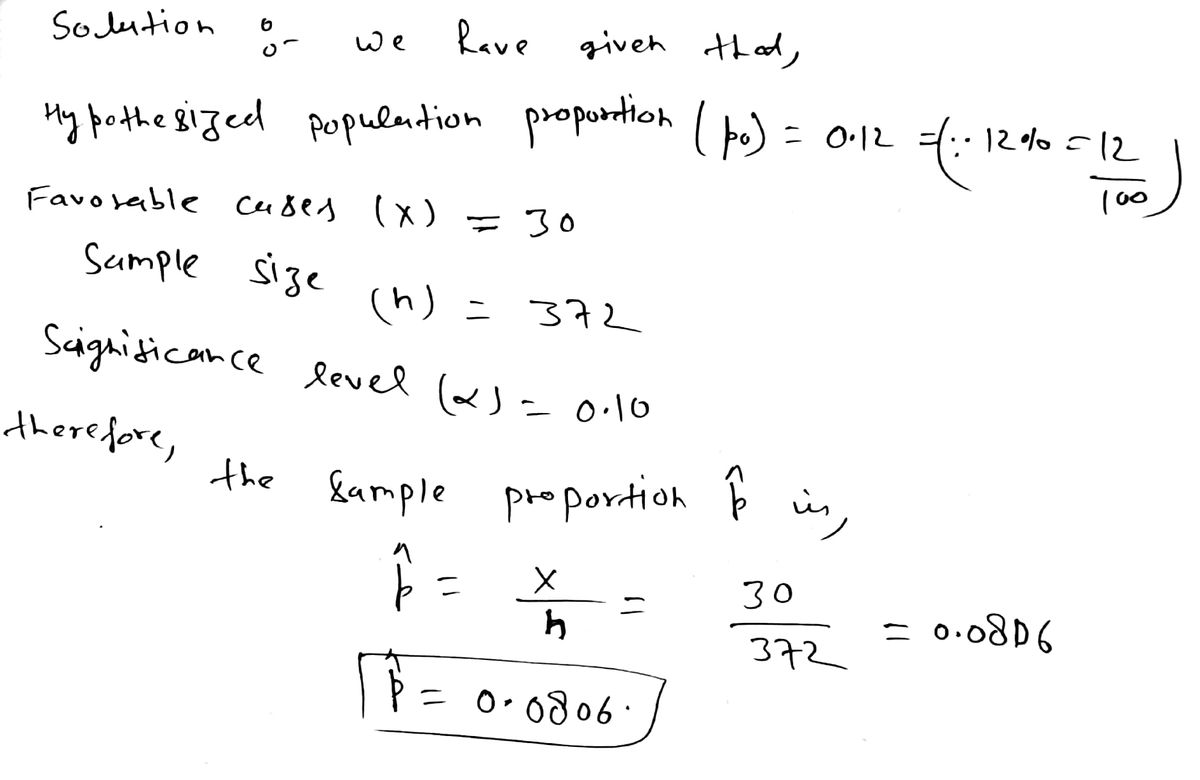12% of all Americans suffer from sleep apnea. A researcher suspects that a different percentage of those who live in the inner city have sleep apnea. Of the 372 people from the inner city surveyed, 30 of them suffered from sleep apnea. What can be concluded at the level of significance of a = 0.10? a. For this study, we should use Select an answer b. The null and alternative hypotheses would be: Ho: ? Select an answer v (please enter a decimal) H1: ? Select an answer (Please enter a decimal) c. The test statistic ? v = (please show your answer to 3 decimal places.)
12% of all Americans suffer from sleep apnea. A researcher suspects that a different percentage of those who live in the inner city have sleep apnea. Of the 372 people from the inner city surveyed, 30 of them suffered from sleep apnea. What can be concluded at the level of significance of a = 0.10? a. For this study, we should use Select an answer b. The null and alternative hypotheses would be: Ho: ? Select an answer v (please enter a decimal) H1: ? Select an answer (Please enter a decimal) c. The test statistic ? v = (please show your answer to 3 decimal places.)
MATLAB: An Introduction with Applications
6th Edition
ISBN:9781119256830
Author:Amos Gilat
Publisher:Amos Gilat
Chapter1: Starting With Matlab
Section: Chapter Questions
Problem 1P
Related questions
Question

Transcribed Image Text:Certainly! Here is a transcription of the image formatted for an educational website:
---
**Hypothesis Testing on Sleep Apnea in Inner City Residents**
A researcher is investigating whether a different percentage of inner city residents have sleep apnea compared to the 12% prevalence among all Americans. From a sample of 372 inner city residents, 30 reported having sleep apnea. The level of significance is set at α = 0.10. Let's analyze what can be concluded:
**a. Test Selection:**
- For this study, we should use (select an appropriate test).
**b. Null and Alternative Hypotheses:**
- \( H_0: \) (The population proportion is 0.12)
- \( H_1: \) (The population proportion is not 0.12)
**c. Test Statistic Calculation:**
- Test Statistic = (Please show your answer to 3 decimal places)
**d. P-Value:**
- P-value = (Please show your answer to 4 decimal places)
**e. Comparison of p-value and alpha (\( \alpha \)):**
- \( \text{p-value} \) (is less than / is greater than) \( \alpha \)
**f. Conclusion Based on Hypotheses:**
- Based on this, we should (Accept / Reject) the null hypothesis.
**g. Final Conclusion:**
- Select the most appropriate statement from the following options:
- The data suggest the population proportion is not significantly different from 12% at \( \alpha = 0.10 \), so there is not sufficient evidence to conclude the population proportion of inner city residents who have sleep apnea is different from 12%.
- The data suggest the population proportion is significantly different from 12% at \( \alpha = 0.10 \), so there is sufficient evidence to conclude the population proportion of inner city residents who have sleep apnea is different from 12%.
**h. Interpretation of the p-value:**
- Choose the correct interpretation:
- There is a 1.96% chance that the percent of all inner city residents having sleep apnea differs from 12%.
- If the population proportion of inner city residents who have sleep apnea is 12% and another 372 inner city residents are surveyed, then there would be a 1.96% chance that either fewer than 8% or more than 16% of the 372 residents surveyed have sleep apnea.
Expert Solution
Step 1

Step by step
Solved in 3 steps with 2 images

Recommended textbooks for you

MATLAB: An Introduction with Applications
Statistics
ISBN:
9781119256830
Author:
Amos Gilat
Publisher:
John Wiley & Sons Inc

Probability and Statistics for Engineering and th…
Statistics
ISBN:
9781305251809
Author:
Jay L. Devore
Publisher:
Cengage Learning

Statistics for The Behavioral Sciences (MindTap C…
Statistics
ISBN:
9781305504912
Author:
Frederick J Gravetter, Larry B. Wallnau
Publisher:
Cengage Learning

MATLAB: An Introduction with Applications
Statistics
ISBN:
9781119256830
Author:
Amos Gilat
Publisher:
John Wiley & Sons Inc

Probability and Statistics for Engineering and th…
Statistics
ISBN:
9781305251809
Author:
Jay L. Devore
Publisher:
Cengage Learning

Statistics for The Behavioral Sciences (MindTap C…
Statistics
ISBN:
9781305504912
Author:
Frederick J Gravetter, Larry B. Wallnau
Publisher:
Cengage Learning

Elementary Statistics: Picturing the World (7th E…
Statistics
ISBN:
9780134683416
Author:
Ron Larson, Betsy Farber
Publisher:
PEARSON

The Basic Practice of Statistics
Statistics
ISBN:
9781319042578
Author:
David S. Moore, William I. Notz, Michael A. Fligner
Publisher:
W. H. Freeman

Introduction to the Practice of Statistics
Statistics
ISBN:
9781319013387
Author:
David S. Moore, George P. McCabe, Bruce A. Craig
Publisher:
W. H. Freeman